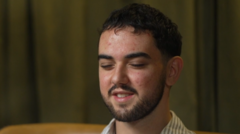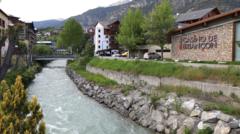Calum Macdonald's story of losing his sight due to methanol poisoning mirrors numerous tragedies experienced by travelers in Southeast Asia. His account highlights the urgent need for increased awareness and safety measures regarding contaminated beverages abroad.
"Blindness and Tragedy: A Survivor's Tale of Mysterious Methanol Poisoning in Laos"

"Blindness and Tragedy: A Survivor's Tale of Mysterious Methanol Poisoning in Laos"
A survivor recounts the harrowing experience of methanol poisoning in Laos, calling attention to the dangers that await unknowing travelers.
When Calum Macdonald crossed into Vietnam from Laos, he was greeted by an alarming vision: a "kaleidoscopic blinding light" that rendered him unable to see. Fresh from partying in Vang Vieng, a tourist hotspot in Laos, Macdonald and his friends had indulged in complimentary whisky and vodka shots at their hostel. Initially dismissing his optical disturbance as food poisoning or sensitivity, the gravity of his situation soon unfolded when he realized he was unable to perceive the light already illuminating his hotel room.
Now 23 and blind, Macdonald is bravely sharing his experience for the first time as a heart-wrenching reminder of a mass methanol poisoning incident that claimed six lives in Vang Vieng last November. Among the victims were two Danish sisters he had met just nights prior. In the wake of this tragedy, Macdonald is collaborating with the families of three other British victims of methanol poisoning in an effort to compel the Foreign Office to improve awareness around the risks associated with alcohol consumption in certain regions.
Another victim, Simone White, had only just texted her mother about how amazing her holiday was before succumbing to methanol poisoning after a night out at the same hostel. Her mother, Sue, received frantic calls from the hospital to authorize emergency brain surgery before Simone passed away. The sudden loss left a gaping void in their lives; "Nothing is going to bring Simone back," Sue laments.
Methanol, often found in products like antifreeze and cleaning supplies, is falsely reminiscent of ethanol, the alcohol in beverages, leading to deadly mistakes especially in settings where spirits may be adulterated. According to Doctors Without Borders, it poses a recurrent fatal hazard for tourists in Southeast Asia, who may not realize they've ingested contaminated drinks due to misleading symptoms resembling typical hangovers. Severe repercussions, including blindness or coma, can follow within days of consumption, with even minimal quantities of methanol potentially proving lethal.
Another case involved Kirsty McKie, who died while enjoying a drink at home in Bali. Her friend Sonia, who survived, reflected on the randomness of fate in their ordeal: "We had no idea." Tragically, Cheznye Emmons suffered a similar fate after drinking gin with a shockingly high methanol concentration before being rushed to a hospital.
Macdonald's harrowing journey and newfound role as an advocate illustrate how one person's misfortune can catalyze a call for change. His advice to travelers is clear: steer clear of free drinks and favor locally crafted beers. Reflecting on the losses of those who did not survive, he admits feeling grateful for the chance to share his message. "I felt, given that I was lucky enough to survive, I have a bit of a responsibility to try and prevent the same thing from happening to other people."
The UK Foreign Office has acknowledged the ongoing issue of methanol poisoning and counterfeit alcohol and is collaborating with local authorities and tourism sectors to mitigate the threats faced by travelers abroad. Through awareness campaigns, they aim to spread safety information to prevent further tragedies.
















